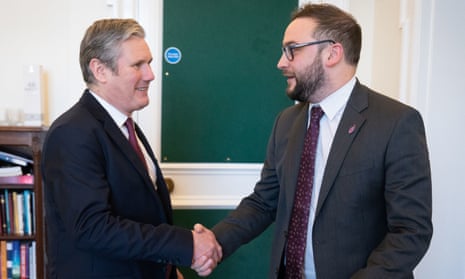To leave feels unthinkable but to stay would be worse. Like ending a marriage or quitting a job you loved, abandoning one’s political tribe is never easy. But after months of agonising, the final break often brings with it a giddy feeling of relief. Odd, then, that there was so little sense of catharsis in Christian Wakeford’s “welcome to Labour” photocall with Keir Starmer, in which the defecting MP for Bury South looked like a man whose sleepless nights were just beginning.
Perhaps he was worrying about his former colleagues scrolling furiously through their phones for old text messages with which to embarrass him. Or maybe he was anticipating a furious denunciation from the left, the minute they checked his voting record. (Young Labour swiftly obliged, tweeting that he shouldn’t be allowed to join the party, while Laura Pidcock – who lost what had been a safe seat for Labour in 2019 – tweeted that her former colleagues’ cheers for a defector swelling their ranks were a “deep insult to all of those fighting this disgraceful government”.)
Wakeford’s personal journey is certainly harder to follow than some. Quentin Davies, who crossed the floor to Labour in 2007, was a passionate pro-European exasperated by his leader’s flirtation with Euroscepticism. Shaun Woodward, the suave millionaire Tory who defected to Labour in 1999, did so after being fired from the Tory frontbench for his support for gay rights (and, many years later, came out as gay himself). Their stories made instinctive emotional sense. Wakeford, meanwhile, says he has wrestled for months with his unease at Conservative decisions on issues such as free school meals and the universal credit cut. But if so, why not rebel? The whips, he says, threatened to withhold a new school from his constituency if he didn’t fall into line on at least one vote, the kind of strong-arm tactics that will rightly shock his constituents but which rebels in the past have had to defy.
Nor is it lost on either side that he had a paper-thin majority in Bury South, a seat he won only after the outgoing Labour-turned-independent MP, Ivan Lewis, urged constituents to vote Conservative in protest against antisemitism in the Labour party. For many on the left, welcoming him aboard while continuing to deny Jeremy Corbyn the whip just rubs salt into their wounds. Yet welcomed he must be, albeit with a silent prayer that due diligence was done first, and that’s not the worst of it. They’re going to have to take at least part of his advice, too.
Wakeford’s defection has spooked his colleagues into briefly suspending their plotting against Boris Johnson, partly for practical reasons – if there was one spy in the rebel camp, then there might be others, just waiting for their moment to decamp to Labour and take all the party’s secrets with them – but also for more emotional ones. Watching one of their own choose a new party over a new leader as the best way out of the current mess was a brutal reminder that voters could easily do the same, coming as it did just as Theresa May’s former pollster James Johnson released polling giving Labour an 11-point lead in the so-called “red wall” seats captured by the Tories in 2019. It’s not Wakeford himself that matters but all the other Wakefords: the countless Conservative voters who share his stirrings of unease, aren’t yet sure what to do about it and are watching closely now. The last thing they need to see is a Labour party recoiling in disgust at the very idea that such people might be attracted to them.
For that fat Labour poll lead hides a large pool of formerly Conservative voters who have shifted only as far as the “don’t know” column, where they’re waiting to see what happens next. Starmer’s job now is to seal the deal with these hovering voters before a punch-drunk government, which is willing to do whatever it takes to get them back, has time to scrape itself off the floor. If parts of the Labour movement can’t conceal their distaste for that project, then they have forgotten what politics is for.
To the horror of some who backed Starmer for leader and the delight of others, last autumn he came off the fence on which he has been sitting since the leadership contest and landed, with a thud, on the side of doing what it takes to win. The playbook is familiar to anyone old enough to remember pre-Corbyn Labour – speeches on patriotism, claims to be “the party of business” – but this isn’t 1997 all over again. Many of the Conservative voters Starmer needs to win over aren’t alien to Labour traditions; rather, they are its tradition. They’re people who voted Labour all their lives before taking a punt on Boris Johnson and regretting it. Tales of boozing through lockdown made them feel taken for fools, and Labour’s task is to connect that anger, which crosses party lines, to an economic argument that resonates equally widely but moves the battle on to Johnson’s likely successors. In a week when inflation topped 5%, that no longer looks impossible.
In talks before he defected, Wakeford reportedly advised Starmer to focus on rocketing energy bills, telling him that “we’ve got nothing” in response. Here, political necessity marries happily with gut Labour instincts. Soaring food and heating costs will force the poorest into unimaginably dire straits; who on the left isn’t incensed by that? But higher heating bills will also be keenly felt by pensioners on fixed incomes, businesses at a fragile point of post-pandemic recovery and ordinary families who were managing until the price of everything started going through the roof.
So where is the chancellor? For weeks, Rishi Sunak has sidestepped all the scandal by piously insisted he’s just getting on with the day job. What has he got to show for it? Where’s the plan to soften the blow everyone knows is coming this spring, when soaring energy bills meet national insurance rises? Rachel Reeves, his Labour shadow, has been weeks ahead of him with detailed proposals.
Winning over former Tory voters won’t always be this easy. Obviously there are painful conversations to come, on issues that threaten to split the Labour party all over again. But right now a government waiting for Sue Gray to put it out of its misery is in no fit state to set the agenda and Labour has a priceless chance to show its concerns are the country’s. If it throws that away in favour of yet more glorious infighting, then frankly it deserves to lose.
Gaby Hinsliff is a Guardian columnist

